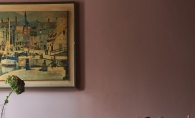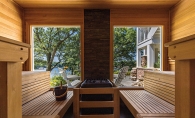The wind has always whistled across Warren Krohn’s 700-acre family farm in Nicollet County. Recently the farmer decided to do something about it. Six windmills now stand 160 feet tall on or near his family’s land. When the turbines spin, the wind becomes what Krohn sees as a new cash crop. “When the wind blows now, we have free energy,” he says.
At one time, windmills were a part of most every family farm. “There’s hardly a farm around here that didn’t have a windmill that pumped water years ago,” Krohn says. As electric lines started reaching rural areas, the windmills disappeared. Now, Krohn says bringing them back is much like introducing a new herd to his land.
“I think every farmer around here should be looking at it,” he says. “It’s like putting up another sow barn, steer barn or a new crop in a field. It is a way of getting income and farming.” The electricity that Krohn produces generates energy and money for his farm. “The energy is there. It’s just sitting and waiting to be harnessed,” he says.
Getting in the Business
When Krohn and his family decided to get into the wind business, they turned to Renewable Energy SD, a one-stop-shop wind turbine company located in Excelsior. The company is only two years old but has already established a reputation as a leader in the wind turbine world.
“Business is good,” says president Shawn Dooling. In 2010, sales revenue topped $16 million. In 2011, the company projects it will generate as much as $64 million. “We see this field expanding rapidly, and we are increasing staff as we speak,” Dooling says. The company currently employs 31 people.
Dooling wanted to develop a company that helps farmers and municipalities navigate through the sometimes complex process of owning a wind turbine. “We handle everything from the feasibility study and permits to agreements with the [electrical] co-op and installation, then service after the sale,” he says. “We handle everything start to finish so the customer doesn’t have to chase permits.”
Unlike the large wind farms that operate in the western states, Renewable Energy focuses on 160-foot towers that fuel energy to properties with a minimal amount of acreage, usually about five-plus acres. “A lot of people can take advantage of wind energy, but it’s not for everyone,” says Dooling. “The [neighborhoods of the] Lake Minnetonka area is not an area where you’re going to see our product.” Not only would a wind turbine most likely upset the neighbors, Dooling says it wouldn’t be cost-effective. “The place for these things is not in the backyard.”
Instead, Renewable Energy is at work throughout outlying communities and exurbs in the Midwest. Some of the company’s business is out of state, but currently they have around 150 projects in the works in Minnesota. “Minnesota has some of the best wind in the country,” Dooling says. “Our product offering lets people generate their own renewable energy. It’s good for the environment. When you are doing small amounts of generation like we do—one [turbine] here and one [turbine] there—you don’t have stresses on the grid.”
Dooling is particularly proud that all of the products Renewable Energy uses are made in America. “That is a big thing,” says Dooling. “You need products to be dependable and you need to be able to get service quickly and get a machine operating again.” Renewable Energy’s dealer factory network includes one of the top small turbine manufacturers: Polaris America.
Picking Up Speed
Harnessing the wind as a source of renewable energy is picking up more support. “No energy source is perfect as in the case of wind energy, but the positive attributes are outweighing the negative,” says Michael Reese, renewable energy director at the University of Minnesota West Central Research and Outreach Center. “Wind energy is a low-cost, proven, domestically produced energy source.”
Despite the state having plenty of wind, Reese says it’s not anticipated that the wind will ever be able to meet 100 percent of the country’s energy supply. However, he believes it can supply a significant portion. “Most rural, sparsely populated regions view a moderate amount of wind turbines as a benefit to the local communities as wind farms can bring significant economic development,” says Reese. “Wind energy has moved from the fringes to become a reliable, cost-effective technology.”
Reese believes business opportunities still exist in the field of wind energy. While there are obvious areas of growth in parts, service or upgrades, Reese says there also needs to be more effort placed in making wind turbines more affordable. “Any components or services that can improve longevity, production and ultimately lower the cost of production will be important,” he says. “Also, technology advances are needed to make small wind turbines more cost effective.”
A Blessing, Not a Curse
Federal grants, tax credits and stimulus money help put more wind turbines on the landscape.
“If it wasn’t for stimulus money, we couldn’t have afforded to do it,” says Mark Halla of the Mustard Seed Landscaping and Garden Center in Chaska. Halla says grant money covered 55 percent of the cost of putting up a wind turbine on his property, but getting the money and getting the turbine in motion was quite a process. He interviewed six companies before settling on Renewable Energy. “We found a sense of comfort that [Dooling] wasn’t going to sell us something for the sake of a sale. Everyone wanted to sell us a 100 foot tower, but that wasn’t best for us.”
Renewable Energy guided Halla through the paperwork process. Preparation on the turbine site at the Mustard Seed property took most of the winter and spring. After the tower was erected, Halla flew an American flag up top until the turbine arrived in May. “It was so cool that I want to leave it there and not take it off,” laughs Halla.
Now, the Hallas have a 160-foot tower on their property that generates energy for the nursery. “Since we moved on this site six years ago, it has been so windy our shrubs would not stand up,” he says. “We’ve been battling the wind since that day, so we decided to use the wind as a blessing and not a curse.”
Halla says that Mustard Seed might be the only garden center in Minnesota with a turbine, but he thinks there will be more to come. If there are, Renewable Energy will be one of the companies there to help, as sure as the wind blows.









